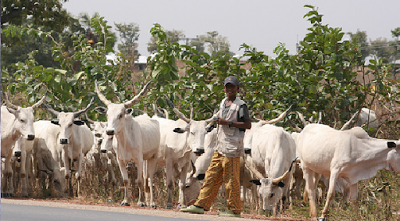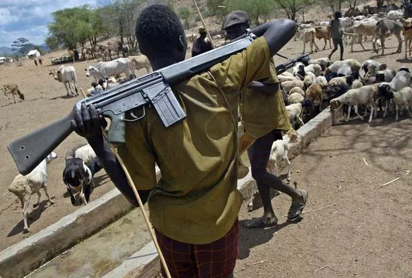Besides the branding of cows to avoid incidences of rustling, a gathering of civil society players has also demanded for the fast-tracking of the enactment of the legislation against open grazing of livestock in Benue State. These ideas formed part of a series of recommendations arrived at last Tuesday after a daylong Dialogue On Peace-Building between indigenous farmers and insurgent herdsmen in Markurdi, the state capital.

While ensure that a census of livestock is taken at borders as an interim measure pending the passage of the National Grazing Reserve Bill into law, participants at the workshop organised by the Angel Support Foundation (ASF) likewise want herdsmen to revert to the use of sticks and knives instead of sophisticated weapons in the interim pending the passage of the bill, which recently scaled the Second Reading at the National Assembly in Abuja.
Observers believe that the Tiv/Fulani crisis has become one of the most devastating catastrophes that have bedevilled the state after the Tiv/Jukum crisis of neighbouring Taraba State. Local Government Areas (LGAs) such as Logo, Guma, Agatu, Buruku, Tarka, Kwande, Ukum and a host of others have come under severe attacks arising from the calamity.
As a consequence, lives and property have been destroyed, with women and children bearing much of the attendant consequences. Participants cited the case of the recent incidence in Agatu that resulted in the killing of pregnant women, children and the youth, as well as the destruction of shelter and disruption of farming activities – the lifeline of Benue indigenes. Resulting from the crisis, farmlands were deserted, as indigenous farmers fled for their lives.
The forum, which had stakeholders drawn from government Ministries, Department and Agencies (MDAs), civil society, Internally Displaced Persons (IDPs), herdsmen, United Nations High Commissioner for Refugees (UNHCR) and the media, attempted to explore the immediate and remote causes of the crisis in the state with a view to coming up with workable solutions to curtail, mitigate and prevent future occurrence of the crisis in communities where they have been curtailed. The meeting was also aimed at developing a Tiv/Fulani peace pact.

Lead discussant, Gideon Inyom, stressed that the relationship between the Tivs and Fulanis existed for over 100 years, but that it (the relationship) had gone sour for about a decade now. Inyom explained how the Fulanis were hitherto guests in Tiv land and then suddenly became landlords. He attempted to unravel the reason for the twisted relationship and the need for a lasting solution.
Indeed, the forum identified the major cause of the crisis to include over stressed land within the Benue valley, worsened by the fact that the Fulanis are usually around only during the dry season.
Arido Boyiri, a representative of the herdsmen, informed the house that the Fulanis came into Benue in 1943 and that most of them were born and brought up in the state. He appealed to the government to take criminal acts more seriously, underlining the need to arrest and timely prosecute those who cause trouble in communities. He agreed to collaborate with the government to identify the strange Fulanis, and also come up with a concrete data base of Fulanis who graze within the Benue valley.
Mary Sewuese Ugbaa, Executive Director of ASF, lamented that the Tiv-Fulani crisis has been a continuous predicament that has distorted the peace and harmony that was hitherto enjoyed in the state. According to her, past efforts to address the unsavoury development had failed to yield the desired result.
“We strongly desire to make meaningful contributions based on what we know is true. We also hope that at the end of the day we would have generated enough ideas towards the development of a Benue State / Fulani Peace Compact containing all our agreed decisions so as to work with the government in fostering sustainable peace in these communities and Benue at large,” she said, adding:
“Today’s event is a first step in a series of events, as we intend to continually hold forums like this regularly to deliberate on the topical issues bordering the lives of our people within communities in Benue State in particular and Nigeria in general.”
The forum suggested that, in order to find a lasting solution to the problem, the Nasarawa State Government should be involved in issues of peace building, resulting from the shared boundary and the movement of Fulanis.
Participants insisted that the principal duty of government is the protection of lives and property and that, as a result of the crisis, the needs of the IDPs is not just a plate of food but a shelter over their head.
On building lasting peace between the indigenous farmers and insurgent herdsmen (Tiv/Fulani), it was agreed that issues of ranching of cattle, enhancement of security apparatus in the state, effective communication, and a cattle census be given proper attention.
Other recommendations at the forum were listed to include:
- Coalition of NGOs working against insurgency and insolvency to provide a common front in tackling the problems between farmers and herders
- Effective warning systems and response to be put in place in the communities prone to attacks
- Provision of effective security at border posts, local vigilantes, Joint-Task Force established
- Synergy between border states and Benue, the amnesty programme be replicated in neighbouring states
- Engaging the telecom players in involving in social responsibility by providing toll-free emergency lines
- Imperative of a Benue State / Fulani Peace Compact to sustain peace
- Enlightenment of communities across the state on patriotism and selflessness
- Proscribed punishment for promoters and actors in the crisis
- The CSOs and NGOs and MDAs should have a synergy in managing the conflicts and running of the IDPs and humanitarian efforts
- Increased security presence in the local communities especially the conflict prone areas, that is establishment of barracks and other formations will be of help
- Provision of agricultural inputs to aid internally displaced persons in addition to the foodstuffs and building materials in rebuilding them rather than occasional visits
- Enlightenment of non-affected communities on security measures
- Provision of shelter for affected communities like it is done by the UNHCR in the state
- Provision of adequate security to the IDPs
Goodwill messages were delivered by representatives of the Benue State Ministry of Agriculture and Natural Resources, UNHCR, Justice Development and Peace Commission (JDPC) and State Emergency Management Agency (SEMA).
